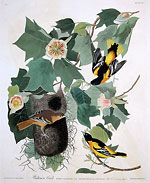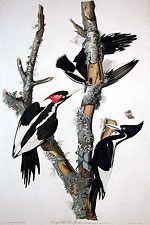For the Birds
When a set of first edition Audubon prints were stolen in 1971, a gutsy bookseller trapped the thief. By Jeremy B. Dibbell
For this installment of “Crimes Against Humanities,” a look into the archives at a historical theft, the 1971 heist of an Audubon volume from Union College in Schenectady, New York (my undergraduate alma mater, I should note in the interests of full disclosure).
The story begins in 1844, when John James Audubon visited Union’s campus and sold a four-volume elephant folio set of his Birds of America to the college’s president, Eliphalet Nott, for the (then) princely sum of $1,000 (a tremendous investment in the long run). Audubon wrote to his son and asked that one of the sets of Birds from his own Manhattan home be shipped to Schenectady. The books arrived less than a year later, but until the 1920s were housed either in the general library stacks or in attic storage. By the 1970s, however, the set was regarded as a prize possession, with one volume displayed in the college’s Schaffer Library at all times. Each week, the librarians carefully turned one page of the massive book, allowing visitors to observe another of Audubon’s masterful creations. But on the night of June 13, 1971, a thief broke through a window in the library, smashed the display case, sliced the binding from the volume, and made off with the 100 plates inside.
Union quickly placed an advertisement in AB Bookman’s Weekly, a well-known book trade publication (in the pre-Internet days, this was the fastest way to report such thefts to the trade): “A reward of $2,000 has been posted for the return of Volume I of the elephant folio edition of Audubon’s Birds of America (1827-1830), stolen the night of June 13/14, 1971, from Schaffer Library, Union College, Schenectady, New York. The volume contains plates numbered 1 through 100. Cover dimensions are 39 inches by 26 inches. It is believed that the thief cut himself in breaking a window, and the cover and one or more plates may be bloodstained.” Letters to the same effect were also sent to book dealers across the United States and Canada.
Almost a month later, after hope for return of the Birds had gone south, a call came in to Union from John H. Jenkins, a 31-year-old bookseller in Austin, Texas. On July 8, a man phoned his shop, gave his name as “Carl Hoffman,” and said that he had some rare books for sale. Jenkins invited Hoffman to come by his shop, and the caller accepted. Hoffman claimed to have found some old books in an attic, including a sixteenth-century manuscript of the Koran and “some old pictures of birds.” Jenkins, intrigued, asked if the bird pictures happened to be Audubons, and Hoffman said they were. As Jenkins later recalled the visit in his 1976 book Audubon and Other Capers (somewhat embellished, it should be noted, from his letters written at the time of the incident), he asked Hoffman how many Audubon plates he had found.
‘I have a hundred,’ he said, ‘numbered 1 through 100, with no gaps.’
‘You mean you have the wild turkey and all of the early plates?’ He said he did.
‘Well,’ I allowed, swallowing hard, ‘I might be interested in buying those.’
Jenkins became more and more interested as he listened to Hoffman’s tale, knowing that a complete set of numbered Audubon prints would be worth a fortune. He tried to arrange a time to view the items, and Hoffman stated that he would call Jenkins within a week to set a meeting time and place.
Coincidentally, that morning’s mail brought Jenkins his issue of AB Bookman’s Weekly, and in leafing through the magazine, Jenkins discovered not only Union’s notice but also one from a bookseller in New York City who had been robbed of a number of rare works, including a Koran fitting the description of the one Hoffman offered. Jenkins had taken Hoffman’s name and phone number, so he contacted Union, the bookseller in New York, and the Federal Bureau of Investigation with the information. Jenkins later wrote that the FBI “told me that it was all very interesting - though they made it fairly clear that it wasn’t, really - but they said they doubted I’d ever hear from the man again.” If he did, though, the Bureau asked him to call back. A letter to Union librarian Edwin Tolan confirmed these facts.











